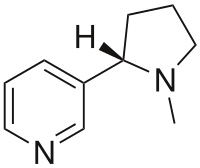
Back انسحاب النيكوتين Arabic Sindrome d'astinenza da nicotina Italian Никотиновая абстиненция Russian Triệu chứng cai nicotine Vietnamese
| Nicotine withdrawal | |
|---|---|
 | |
| Nicotine molecule | |
| Specialty | Psychiatry |
| Symptoms | Cravings for nicotine, anger or irritability, anxiety, depression, impatience, trouble sleeping, diarrhea, restlessness, hunger, and difficulty concentrating |
| Usual onset | 2-3 hours after last intake of nicotine |
| Duration | 2-4 weeks |
| Causes | Physical dependence |
| Diagnostic method | Based on symptoms |
| Treatment | Nicotine replacement therapy
Pharmacological treatment (bupropion, varenicline, cytisine, nortriptyline, clonidine) Cognitive behavioural therapy |
Nicotine withdrawal is a group of symptoms that occur in the first few weeks after stopping or decreasing use of nicotine. Symptoms include intense cravings for nicotine, anger or irritability, anxiety, depression, impatience, trouble sleeping, restlessness, hunger, and difficulty concentrating.[1][2][3] Withdrawal symptoms make it harder to quit nicotine products, and most methods for quitting smoking involve reducing nicotine withdrawal.[1] Quit smoking programs can make it easier to quit.[1] Nicotine withdrawal is recognized in both the American Psychiatric Association Diagnostic and Statistical Manual and the WHO International Classification of Diseases.
- ^ a b c Linda J. Vorvick (2013-08-29). "Nicotine and Tobacco". Medline Plus. Retrieved 2015-05-21.
- ^ Hughes, John R. (2007). "Effects of abstinence from tobacco: valid symptoms and time course". Nicotine & Tobacco Research. 9 (3): 315–327. doi:10.1080/14622200701188919. PMID 17365764.
- ^ Piper, Megan E. (2015). "Withdrawal: Expanding a Key Addiction Construct". Nicotine & Tobacco Research. 17 (12): 1405–1415. doi:10.1093/ntr/ntv048. PMC 4654762. PMID 25744958.
© MMXXIII Rich X Search. We shall prevail. All rights reserved. Rich X Search